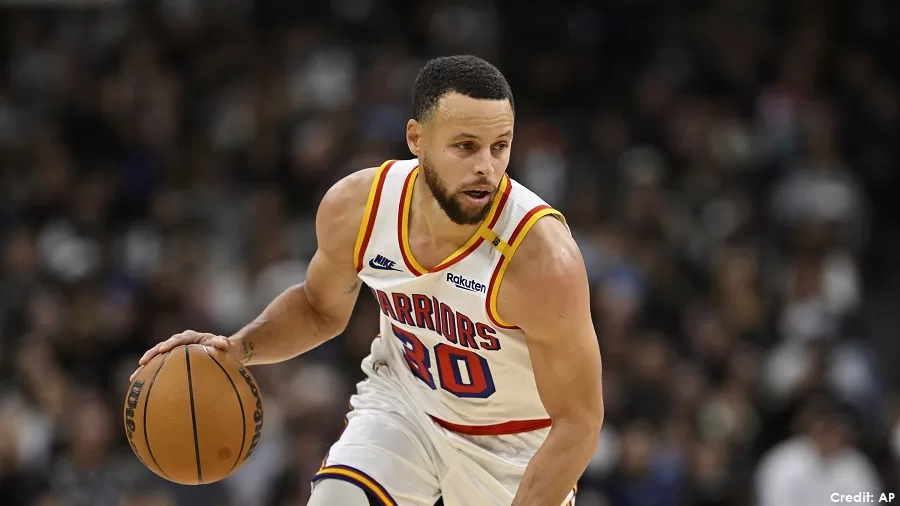Sports
Stephen Curry Questions NBA Structure as Athlete Brand Value Surges Globally

- NBA superstar Stephen Curry raises questions around equity, ownership, and the role athletes play in building billion-dollar sports brands.
- The conversation extends beyond contracts into the realm of power, influence, and shared financial upside.
When Stephen Curry recently sat down for an interview on Gil’s Arena—a podcast hosted by former NBA player Gilbert Arenas—the discussion moved far beyond basketball stats or season previews. Curry expressed what many top-tier athletes have likely thought but rarely vocalised:
“NBA players are underpaid.”
This wasn’t about base salaries or bonus structures. It was about equity—actual ownership in the business side of the game. While Curry is among the highest earners in NBA history, having taken home over $300 million in playing salary alone, he doesn’t hold a stake in the Golden State Warriors, a franchise valued at $8.8 billion as of 2024, according to Forbes.
The League as a Brand Built on Athlete Identity
The NBA’s global appeal is undeniable. Its games are broadcast in over 215 countries, translated into more than 70 languages, and driven largely by player personalities.
Athletes like LeBron James, Kevin Durant, Giannis Antetokounmpo, and Curry himself are not just players—they’re brands. They sell jerseys and anchor endorsements, and serve as the cultural heartbeat of the league. But despite being the key contributors to the NBA’s brand equity, these athletes have limited access to ownership opportunities within the league.
NBA bylaws currently prohibit active players from owning any part of a franchise. The reasoning is based on conflict-of-interest concerns. But for players like Curry, who are not just employees but the most visible symbols of the NBA’s brand, the structure feels outdated.
“We do so much to elevate the brand… and yet we can’t own a part of it,” Curry said.
The Financial Gap: Salaries vs. Franchise Valuation
While Curry is expected to earn nearly $60 million in the 2025-26 season alone, it’s important to note that this is wage-based income. There are no dividends, no equity growth, and no influence over business operations.
Compare this with ownership:
- Michael Jordan purchased the Charlotte Bobcats in 2010 for approximately $275 million.
- In 2023, he sold his majority stake at a valuation of approximately $3 billion.
- His returns from ownership far exceeded his NBA playing salary, which was $93.8 million across his career.
These are numbers that tell a story: Ownership is where real long-term wealth resides in professional sports.
Beyond Endorsements: Athletes Building Their Equity
NBA players today are more than just athletes. They are entrepreneurs, media creators, and investors.
Examples include:
- LeBron James has invested in Blaze Pizza, Fenway Sports Group (owner of Liverpool FC), and The SpringHill Company.
- Kevin Durant has backed more than 80 startups through his firm Thirty Five Ventures, including Coinbase and Postmates.
- Stephen Curry co-founded Unanimous Media, focusing on content aligned with family, faith, and sports, and has reportedly secured backend stakes in commercial partnerships, including those with Rakuten and Under Armour.
These ventures allow players to tap into equity opportunities that they are otherwise denied within the NBA structure.
The Role of Athletes in Shaping League Value
According to Sportico’s December 2024 franchise valuation data, the average value of an NBA team is approximately $4.6 billion. With 30 teams, this puts the league’s collective value at over $138 billion. Yet that value does not grow in a vacuum. It is tied directly to:
- Player performances
- Personalities that attract global audiences
- Their activities on social media and public platforms
Players like Curry contribute massively to the NBA’s international growth. His popularity in China, for instance, drove jersey sales and media rights deals. The NBA’s China operations have been valued in the billions, although specific current figures vary by source and are not officially published.
And yet, despite these contributions, players remain largely excluded from ownership conversations.
Global Comparisons: What About Football?
The NBA isn’t alone. In the Premier League, active players also lack equity in their clubs. Yet retired athletes have started changing that dynamic.
David Beckham secured ownership rights for Inter Miami as part of his exit from MLS. That team, now valued at over $1.2 billion following Lionel Messi’s arrival, showcases what athlete-led branding can do.
Marcus Rashford has strong commercial partnerships, including deals with Nike. But there is no indication of direct brand ownership. While some media estimates place high values on his overall endorsement income, there is no verified report confirming a lifetime deal with Nike worth £78 million.
These athletes build value but see little in terms of equity return.
Should that change?
Reimagining Athlete Compensation Globally
The conversation sparked by Curry suggests a need for a broader rethinking of athlete compensation in elite sports.
Should franchises and leagues explore:
- Revenue sharing beyond salaries and bonuses?
- Deferred equity plans post-retirement?
- Stakeholder models where key athletes own part of the team?
For global sports brands, this isn’t just a moral question. It’s strategic.
Giving athletes skin in the game creates deeper alignment. It retains stars. It builds trust. And it reflects how most successful companies treat their top talent.
What This Means for Brands
Whether you’re managing a football club in the UK, an NBA team in the US, or a Formula 1 team based in Monaco, there’s a clear lesson:
- Brands are built on identity
- Identity today is built on personality
- Personalities want ownership
If brand growth comes from athlete charisma and community engagement, those contributors will want a slice of the upside.
Curry’s Comments as a Cultural Inflexion Point
Stephen Curry’s interview doesn’t stand alone. It echoes a growing athlete awareness of value creation.
From the WNBA to the UFC, from global cricket leagues to Olympic campaigns, players are starting to ask not just for pay but for partnership.
Athletes are building brands within brands. And they are no longer satisfied with temporary applause.
They want—and perhaps deserve—equity.























































